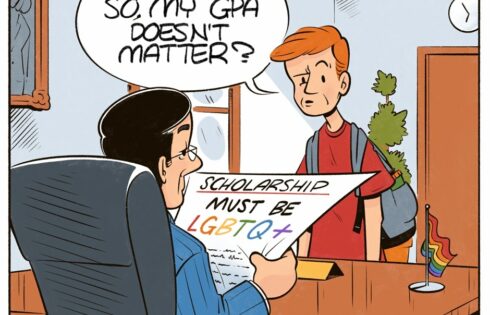
‘Won’t sufficiently prepare them for college-level math courses’
There’s an effort in California to dumb down math at the K-12 level in the name of equity, but a growing number of Science, Technology, Engineering and Math scholars urge officials to reject the plan.
To date, nearly 1,800 STEM scholars have signed on to the “Open Letter on K-12 Mathematics,” stating they are alarmed at the current proposal to fight achievement gaps in math pushed by progressives in the Golden State.
As The College Fix has previously reported, a framework before the California Department of Education would move more advanced math classes from the state’s middle schools to high schools to make math more equitable to students of all levels.
The framework also rebukes student giftedness, alleging the concept creates “considerable inequities in mathematics education.”
But the some 1,800 scholars who have signed the open letter argue that developing students who can perform high-level math is crucial to the nation’s vital information technology infrastructure and economic competitiveness:
College students who need to spend their early years taking introductory math courses may require more time to graduate. They may need to give up other opportunities and are more likely to struggle academically. Such a reform would disadvantage K-12 public school students in the United States compared with their international and private-school peers. It may lead to a de facto privatization of advanced mathematics K-12 education and disproportionately harm students with fewer resources.
Another deeply worrisome trend is devaluing essential mathematical tools such as calculus and algebra in favor of seemingly more modern “data science.” As STEM professionals and educators we should be sympathetic to this approach, and yet, we reject it wholeheartedly. The ability to gather and analyze massive amounts of data is indeed transforming our society. But “data science” – computer science, statistics, and artificial intelligence – is built on the foundations of algebra, calculus, and logical thinking.
… There cannot be a “one size fits all” approach to K-12 mathematical education. Students should be offered multiple pathways and timelines to explore mathematics. But one of these pathways should be the option to obtain the fundamental preparation for college-level STEM, including algebra, calculus, and logical reasoning. Students should have the opportunity to take those classes at varying grade levels of middle and high school when they are ready, so that they acquire the tools to explore other STEM options and can build their proficiency in a balanced pacing, avoiding irresponsible compression late in high school.
Lizzie Hager-Barnard, director of K-12 outreach at UC Berkeley’s College of Engineering, told The Californian student newspaper that the proposal also does the opposite of helping close the achievement gap.
Hager-Barnard said the data science track would inadequately prepare students for college-level math courses and exacerbate existing racial and gender disparities in STEM, The Californian reported on Sept. 19.
“Students who are perceived to be struggling in math — the very ones the proposed framework claims to want to help — will not be helped by this proposed framework,” Hager-Barnard said. “These students will likely be encouraged to take a pathway that’s perceived to be easier and more engaging, but this pathway won’t sufficiently prepare them for college-level math courses.”
Among the mathematics framework’s proposed changes is also the addition of a “Pathway to Equitable Math Instruction” resource that advises educators that a focus on getting the “right” answer is a “toxic characteristic” of math instruction.
California Department of Education spokesman Scott Roark told The Californian that officials have received a massive stack of feedback and requested edits to the framework.
Roark said officials are reviewing the comments and will provide the California State Board of Education a final recommendation for adoption in 2023.
IMAGE: WK1003Mike / Shutterstock
Like The College Fix on Facebook / Follow us on Twitter





Please join the conversation about our stories on Facebook, Twitter, Instagram, Reddit, MeWe, Rumble, Gab, Minds and Gettr.